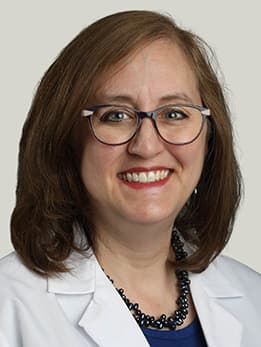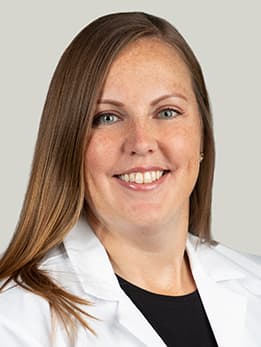Iron-Deficiency Anemia in Children
Iron-deficiency anemia is a condition involving the red blood cells, which carry oxygen from the lungs to other parts of the body. Diagnosing and treating iron-deficiency anemia is important to prevent problems with your child’s growth and development.
At the University of Chicago Medicine Comer Children’s Hospital, our doctors are experts in treating iron-deficiency anemia and other childhood anemias and blood diseases. Our multidisciplinary team can work with you to develop a personalized care plan so your child can thrive.
What is iron-deficiency anemia?
Iron-deficiency anemia is the most common type of anemia in children. It occurs when children don’t get enough iron, which they need to make hemoglobin, the protein in red blood cells that binds to and delivers oxygen to all the tissues in the body. In fact, anemia is defined as low hemoglobin.
What are the symptoms of iron-deficiency anemia?
Children with mild iron-deficiency anemia may not have any symptoms. But as the condition gets worse, children may develop symptoms such as:
- Tiredness or fatigue
- Pale skin, tongue, palms or nail beds
- Shortness of breath
- Dizziness or lightheadedness
- Headaches
- Cold hands and feet
- Cravings to chew ice or substances with no nutritional value, like dirt or paper
If you notice any of these signs in your child, it is important to see your pediatrician or a pediatric hematologist, a specialist in childhood anemias and blood diseases.
What Parents and Caregivers Need to Know About Iron-Deficiency Anemia
In young people, some of the common causes of iron-deficiency anemia include:
- Not getting enough iron from foods or breastmilk
- Drinking too much cow’s milk, which is very low in iron and has calcium that can interfere with how the body absorbs iron
- Digestive diseases that affect how the body absorbs iron
- Blood loss, including heavy menstrual bleeding in preteens and teens
The risk for iron-deficiency anemia is higher among:
- Infants of mothers with anemia, as well as babies who were premature or had a low birth weight
- Toddlers of Mexican or African descent
- Young women in the first few years after starting their period
- Young people who follow a vegetarian or vegan diet
- Children with certain hereditary bleeding disorders and other conditions with chronic bleeding
However, any child, preteen or teen can develop iron-deficiency anemia if they don’t get enough iron in their diet. How much iron your child needs depends on their age and other factors.
The American Academy of Pediatrics recommends screening your baby for iron-deficiency anemia at around 12 months of age because the risks are often highest during early childhood. You can talk to your pediatrician about screening.
A complete blood count test can help your doctor determine if your child has anemia, and other blood tests are used to determine if the anemia is due to iron deficiency.
If your child has iron-deficiency anemia, it is important to treat the condition to prevent harm to your child’s health and development. At Comer Children’s, our team of experts will work with you to determine the cause and the best treatment strategy for your child.
Iron supplements (such as ferrous sulfate) in liquid or pill form can help children, preteens and teens replenish their iron. But some young people may have constipation, upset stomach or other side effects from iron supplements. Taking iron supplements with meals can help, but if your child still has problems, trying other forms of oral iron or getting iron via infusion (through the vein) may be the best option.
Adding more iron-rich foods to your child’s diet is also important.
Eating foods that are rich in iron can help prevent and treat anemia. This includes:
- Lean meat like beef, pork and poultry
- Beans and tofu
- Dark green vegetables like broccoli and spinach
- Eggs
- Fatty fish like salmon
- Dried fruits like raisins
- Breads, cereals and pastas that are enriched with iron
Adding more foods that are good sources of vitamin C can also help because they allow the body to absorb more iron. These include:
- Citrus foods like oranges
- Tomatoes
- Sweet potatoes
- Berries
- Broccoli and kale
If you have a picky eater at home, you can try these strategies to sneak more iron into their diet:
- Blend spinach, berries and oranges into smoothies.
- Add beans or lean meat to pasta sauce.
- Toss raisins or other dried fruits into the batter of baked goods.
- Cook with a cast-iron skillet, or add a piece of iron (such as Lucky Iron Fish) to water when cooking pasta.
If you need help finding ways to add more iron to your child’s diet, our team can help.
Besides choosing iron-rich foods, reducing the amount of milk products in your child’s diet may help. Milk is a healthy drink that provides calcium, vitamin D and protein, but too much milk in the diet can lead to iron deficiency. That’s because calcium can interfere with how the body absorbs iron, and milk has extremely low iron content. Children who drink too much milk get too full to eat other foods that contain more iron, and they can easily become iron deficient. The American Academy of Pediatrics recommends limiting young children to no more than 16 ounces to 20 ounces (2 cups to 2.5 cups) of milk per day.
Meet our Iron-Deficiency Anemia Experts

Pediatric Hematology & Oncology (Pediatric Cancer)

Pediatric Hematology & Oncology (Pediatric Cancer)

Pediatric Hematology & Oncology (Pediatric Cancer)

Pediatric Hematology & Oncology (Pediatric Cancer)

Pediatric Hematology & Oncology (Pediatric Cancer)

Pediatric Hematology & Oncology (Pediatric Cancer)
Request an Appointment for Pediatric Blood Disorders
We are currently experiencing a high volume of inquiries, leading to delayed response times. For faster assistance, please call 773-702-6808 to schedule your appointment.
If you have symptoms of an urgent nature, please call your doctor or go to the emergency room immediately.
For Referring Physicians
To refer a pediatric patient, please call UCM Physician Connect at 1-800-824-2282.
* Indicates required field
